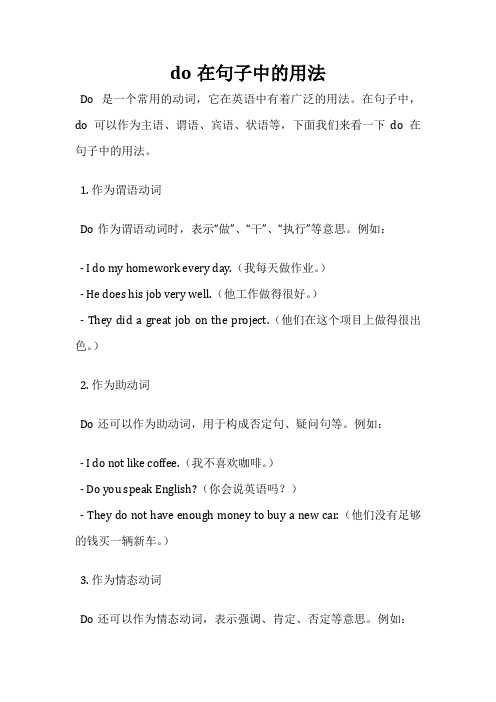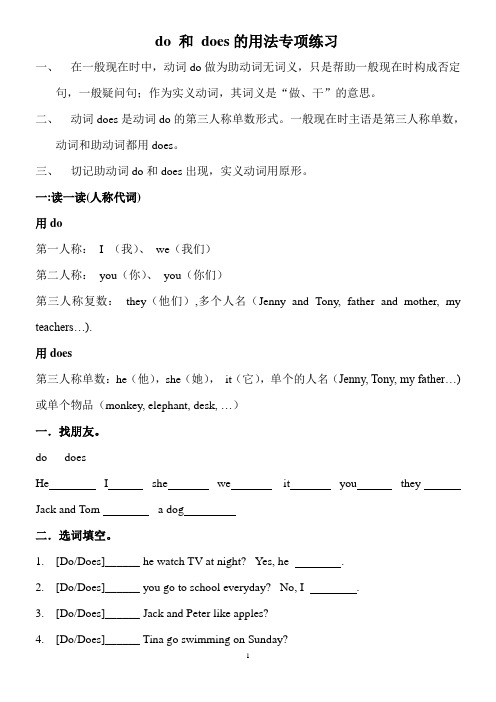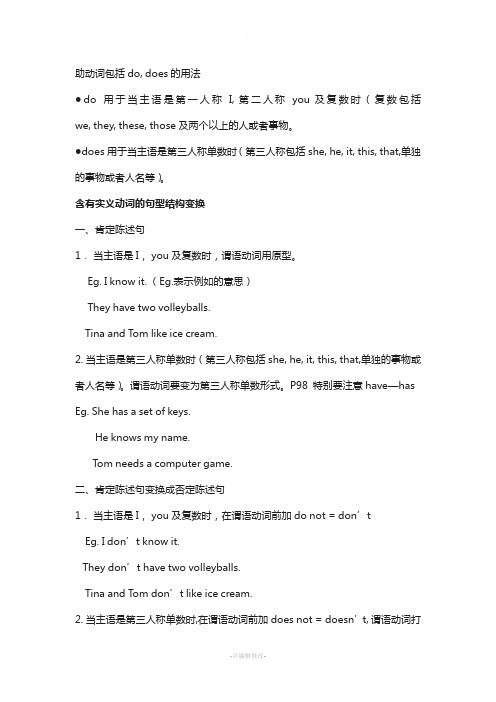10、do和does的用法
16种时态

英语时态分为16种,如下表所示各时态结构及用法1. 一般现在时(do/does; is/am/are)①表示现在的情况、状态和特征。
例:He is a student.他是一个学生。
②表示经常性、习惯性动作。
例:He always helps others.他总是帮助别人。
③客观事实和普遍真理。
例:The earth moves the sun.地球绕着太阳转。
④表示一个按规定、计划或安排要发生的动作。
(常用于列车、客车、飞机或轮船时刻表)例:The next train leaves at 3 o'clock this afternoon.下一趟火车今天下午3点开车。
⑤主将从现:在时间、条件和让步状语从句中经常用一般现在表示将的来事情。
例:If it rains tomorrow, we will stay at home.如果明天下雨,我们会待在家里。
2. 现在进行时(am/is/are doing)①表示此时此刻正在发生的事情。
例:He is listning to the music now.他现在正在听音乐。
②表示目前一段时间内一直在做的事情,但不一定此时此刻正在做。
例:I am studying computer this term.这个学期我一直在学习计算机。
③现在进行时可以表示将来的含义。
瞬时动词的进行一定表将来。
例:I am leaving.我要离开了。
持续动词的进行只有有将来的时间状语或有将来语境中才表将来。
例:I am travelling next month.下个月我要去旅行。
④现在进行时与频度副词连用,表示说话者或褒义或贬义的感情色彩。
例:He is always helping others.他总是帮助别人。
(褒义)3. 过去进行时(was/ were doing)①表示在过去一个具体的时间正在发生的动作。
例:Mary was listening to light music 10 minutes ago.10分钟前,玛丽正在听轻音乐。
do在句子中的用法

do在句子中的用法Do是一个常用的动词,它在英语中有着广泛的用法。
在句子中,do可以作为主语、谓语、宾语、状语等,下面我们来看一下do在句子中的用法。
1. 作为谓语动词Do作为谓语动词时,表示“做”、“干”、“执行”等意思。
例如:- I do my homework every day.(我每天做作业。
)- He does his job very well.(他工作做得很好。
)- They did a great job on the project.(他们在这个项目上做得很出色。
)2. 作为助动词Do还可以作为助动词,用于构成否定句、疑问句等。
例如:- I do not like coffee.(我不喜欢咖啡。
)- Do you speak English?(你会说英语吗?)- They do not have enough money to buy a new car.(他们没有足够的钱买一辆新车。
)3. 作为情态动词Do还可以作为情态动词,表示强调、肯定、否定等意思。
例如:- I do love you.(我确实爱你。
)- He does not smoke.(他不吸烟。
)- Do be careful when you cross the street.(过马路时要小心。
)4. 作为主语Do还可以作为主语,表示“事情”、“工作”等意思。
例如:- Do is a very important thing in our life.(做事情在我们的生活中非常重要。
)- What do you do for a living?(你靠什么谋生?)5. 作为宾语Do还可以作为宾语,表示“做某事”、“完成某事”等意思。
例如:- I have to do my homework before I can go out to play.(我必须先做完作业才能出去玩。
)- She did a great job on the project.(她在这个项目上做得很出色。
do-和-does的用法专项练习

do 和does的用法专项练习一、在一般现在时中,动词do做为助动词无词义,只是帮助一般现在时构成否定句,一般疑问句;作为实义动词,其词义是“做、干”的意思。
二、动词does是动词do的第三人称单数形式。
一般现在时主语是第三人称单数,动词和助动词都用does。
三、切记助动词do和does出现,实义动词用原形。
一:读一读(人称代词)用do第一人称:I (我)、we(我们)第二人称:you(你)、you(你们)第三人称复数:they(他们),多个人名(Jenny and Tony, father and mother, my teachers…).用does第三人称单数:he(他),she(她),it(它),单个的人名(Jenny, Tony, my father…)或单个物品(monkey, elephant, desk, …)一.找朋友。
do doesHe I she we it you theyJack and Tom a dog二.选词填空。
1. [Do/Does]______ he watch TV at night? Yes, he .2. [Do/Does]______ you go to school everyday? No, I .3. [Do/Does]______ Jack and Peter like apples?4. [Do/Does]______ Tina go swimming on Sunday?5. [Do/Does]______they play football? Yes, they _ __[do/does]6. [Do/Does]______ we have a good teacher? Yes, we ___ _[do/does]7. [Do/Does]_____ they jump rope ? No, they _ __[do not/does not].8. [Do/Does]_____your dog walk in the zoo?9. [Do/Does]____ I have a big nose? No, you _____[do not/does not]10. [Do/Does]____ your cats eat fish? Yes, they _____.[do/does].二:认一认,读一读(请分辨哪些是第三人称单数并圈出)Tony friend my father Jenny Gogo and Tom it the cat my teacher they you my brothers ant ants she he father and mother my brother my brothers friends your sister your sisters teachers三:填一填,读一读(用do 和does/don’t doesn’t填空)1.you like soccer? Yes, I .2.they like ping--pong? Yes, they .3.Tony and Ben like baseball? No, they .4.your friend s like tennis? Yes, they .5.your brother like basketball? No, he .6.you like basketball? Yes, I .7.they like watermelons? No, they .8.Jenny have white bowls? Yes, she .9.Peter have fork? Yes, he .10.your father like apples? Yes, he .11.your friend s like bananas? No, they .12.your father and mother have spoons ? Yes, they .四:造一造,读一读(仿例造句)you, soccer/yes---Do you like soccer? Yes, I do.1.they, juce/no----2.your brothers, oranges/no3.the monkeys,bananas/ yes4.Tony and Gogo, apples/yes5. you, watermelons/yes6. I, milk/no7.She, skirt/yes8.your brother, tea/no9.Tony, basketball/ yes10.her sister, water/no。
2020-2021学年人教版初中英语语法——第10章助动词和情态动词

Do you like college life?你喜欢大学生活吗?(构成疑定句)He is studying English.他正在学英语。
(表示时态)A building was built beside the school.学校旁边建了一座大楼。
(表示语态)Do come to the party tomorrow evening.明天晚上一定要来参加聚会。
(加强语气)英语中的助动词主要有:do,does,did;be;have,has,had,will,would,shall,should等。
1.助动词 do,does,did的7种用法(1)do,does,did用来构成一般疑问句do,does用于一般现在时态,did用于一般过去时态;do用于主语为非第三人称单数形式的句子中,does只用于主语是第三人称单数的句子中。
如:Do you want to have a try?你想要试一试吗?Does she have any good idea?她有好主意吗?Did you study German?你们学德语了吗?(2)do,does,did+not 构成否定句do,does用于一般现在时态,did用于一般过去时态;do用于主语为非第三人称单数形式的句子中,does只用于主语是第三人称单数的句子中。
如:I do not want to go there now.我现在不想去那里。
He doesn't like playing the guitar.他不喜欢弹吉他。
In the past,many students did not know the importance of English.过去,许多学生不知道英语的重要性。
注意:①do not可以缩写为don't;does not可缩写为doesn't;did not可缩写为didn't。
②助动词do,does,did后要用动词原形。
Did动词用法

• 七、放在than前,构成more than短语,相当于 over。它们常放在数词前,表示“多于……,超 过……以上”。 Kate is a good student.She has more than one hundred books. 凯特是一个好学生,她有一百多本书。
11
• 八、more or less为固定短语,相当于about,表 “或多或少;差不多”。 1.They are more or less willing to help. 他们多少愿意帮助。 2.—How far is the post office from here? 邮局离这儿多远? —It’s eight kilometers, more or less.大约八 公里。
• 一本英语教材书上这样写:“除了已经提到的以外,其余 所有的人或物要用“the other +复数名词”。所以我认为 应该填A,但为什么答案是C?答:C,她有三个女儿, 一个是教师,其它两个是护士。
• 你说对一半:“除了已经提到的以外,其余所有的人或物 要用“the other +复数名词”,即:在一个范围之内,一 个和另一些用: one, the other +复数名词, 如:one, the other two daughters. 但是,the other +复数名词= the others,即C的形式,意思相同。
4
• more 一词在课本中出现较频繁。为了让同学们进 一步了解它,现将其常见用法归纳如下: 一、副词,与某些双音节或多音节的形容词、副 词一起构成其比较级。 1.I think our city is more beautiful than yours. 我认为我们的城市比你们的更美丽。 2.Han Mei studies more carefully than Wang Fang. 韩梅比王芳学习更认真。
Do和does用法解析

助动词包括do,does的用法●do用于当主语是第一人称I,第二人称you及复数时(复数包括we,they,these,those及两个以上的人或者事物。
●does用于当主语是第三人称单数时(第三人称包括she,he,it,this,that,单独的事物或者人名等)。
含有实义动词的句型结构变换一、肯定陈述句1.当主语是I,you及复数时,谓语动词用原型。
Eg.I know it.(Eg.表示例如的意思)They have two volleyballs.Tina and Tom like ice cream.2.当主语是第三人称单数时(第三人称包括she,he,it,this,that,单独的事物或者人名等)。
谓语动词要变为第三人称单数形式。
P98特别要注意have—has Eg.She has a set of keys.He knows my name.Tom needs a computer game.二、肯定陈述句变换成否定陈述句1.当主语是I,you及复数时,在谓语动词前加do not=don’tEg.I don’t know it.They don’t have two volleyballs.Tina and Tom don’t like ice cream.2.当主语是第三人称单数时,在谓语动词前加does not=doesn’t,谓语动词打回原型Eg.She doesn’t have a set of keys.He doesn’t know my name.Tom doesn’t need a computer game.三、肯定陈述句变换成一般疑问句采用“一加二变三问号”。
一加:当主语是I,you及复数时,在句子开头加do;当主语是第三人称单数时(第三人称包括she,he,it,this,that,单独的事物或者人名等),在句子开头加does;二变:变大小写;第一人称变为第二人称(I/we变为you,my/our变为your);当主语是第三人称单数时,谓语动词要打回原型。
高中英语动词时态用法详解
高中英语动词时态用法详解时态(Tense)是表示行为、动作和状态在各种时间条件下的动词形式。
因此,当我们说时态结构的时候,指的是相应时态下的动词形式。
英语时态分为16种:一般现在、一般过去、一般将来、过去将来时,以及这四者的进行时、完成时和完成进行时。
下面是16种时态的谓语动词形式和具体用法,高考必考的是前10种时态,同学们需要重点掌握。
1.一般现在时 (do/does; is/am/are)① 表示现在的情况、状态或特征。
例:He is a student.他是一个学生。
② 表示经常性、习惯性动作。
例:He always helps others.他总是帮助别人。
③ 客观事实和普遍真理。
例:The earth moves the sun.地球绕着太阳转。
④ 表示一个按规定、计划或安排要发生的动作。
仅限于某些表示“来、去、动 、停、开始、结束、继续”等的动词,可以与表示未来时间的状语搭配使用 。
常见的用法是:飞机、火车、轮船、汽车等定期定点运行的交通方式。
例:The next train leaves at 3 o'clock this afternoon.下一趟火车今天下午3点开车。
⑤ 在时间、条件和让步状语从句中经常用一般现在(有时也用现在完成时)表示将的来事情。
(即:主将从现原则)例:I will call you as soon as I arrive at the airport.我一到机场就会给你打电话。
When you have finished the report, I will have waited for about 3 hours.等你完成这份报告的时候,我就已经等了将近3个小时了。
2. 现在进行时(am/is/are doing)① 表示此时此刻正在发生的事情。
例:He is listning to the music now.他现在正在听音乐。
② 表示目前一段时间内一直在做的事情,但不一定此时此刻正在做。
16种英语时态,太全了
(Tense)是表示行为、动作和状态在各种时间条件下的动词形式。
因此,当我们说时态结构的时候,指的是相应时态下的动词形式。
时态分为16种,如下表所示:各结构及用法1. 一般现在时(do/does; is/am/are)①表示现在的情况、状态和特征。
例:He is a student.他是一个学生。
②表示经常性、习惯性动作。
例:He always helps others.他总是帮助别人。
③客观事实和普遍真理。
例:The earth moves the sun.绕着转。
④表示一个按规定、计划或安排要发生的动作。
(常用于列车、客车、飞机或轮船时刻表)例:The next train leaves at 3 o'clock this afternoon.下一趟火车今天下午3点开车。
⑤主将从现:在时间、条件和让步状语从句中经常用一般现在表示将的来事情。
例:If it rains tomorrow, we will stay at home.如果明天下雨,我们会待在家里。
2. 现在进行时(am/is/are doing)①表示此时此刻正在发生的事情。
例:He is listning to the now.他现在正在听音乐。
②表示目前一段时间内一直在做的事情,但不一定此时此刻正在做。
例:I am studying by using Qisu APP this term.这个学期我一直在使用奇速英语APP学习。
③现在进行时可以表示将来的含义。
瞬时动词的进行一定表将来。
例:I am leaving.我要离开了。
持续动词的进行只有有将来的时间状语或有将来语境中才表将来。
例:I am next month.下个月我要去旅行。
④现在进行时与频度副词连用,表示说话者或褒义或贬义的感情色彩。
例:He is always helping others.他总是帮助别人。
(褒义)3. 过去进行时(was/ were doing)①表示在过去一个具体的时间正在发生的动作。
does和do的用法总结
"does"和"do"都是助动词,用于构建疑问句、否定句和强调句,并表示动作的发生或存在。
它们的用法如下:1."does"是第三人称单数形式的助动词,用于现在时态的第三人称单数主语(he, she, it):2.疑问句:Does he like coffee?(他喜欢咖啡吗?)3.否定句:He does not (doesn't) like coffee.(他不喜欢咖啡。
)4.强调句:She does love to dance.(她确实喜欢跳舞。
)5."do"用于其他人称和复数主语的一般现在时和一般过去时:6.疑问句:Do you speak English?(你会说英语吗?)7.否定句:I do not (don't) like spicy food.(我不喜欢辣食。
)8.强调句:I do enjoy hiking.(我确实喜欢徒步旅行。
)9."do"也用于现在进行时态的疑问句和否定句中:10.现在进行时的疑问句:What are you doing?(你在做什么?)11.现在进行时的否定句:We are not (aren't) watching TV.(我们不在看电视。
)需要记住的是,"does"和"do"在一般现在时和一般过去时中没有人称和数的变化,但在现在进行时中有所变化。
此外,它们也可以用作强调句中的助动词,用于强调所表示的动作或状态。
总结起来,"does"用于现在时的第三人称单数形式,而"do"用于其他人称和复数形式,且在现在进行时的疑问句和否定句中使用。
初中英语300动词详解(一)——do的用法(越简单越复杂)
初中英语300动词详解(一)——do的用法(越简单越复杂)动词 do 的用法:动词 do 在初中英语中主要有两种用法,一是作实义动词,二是作助动词,助动词的用法较多,较复杂!does(三单)- doing(现在分词)- did(过去式)- done(过去分词)一、do 作实义动词,译为“做,干”do homework 做作业 do housework 做家务Students do homework everyday. 学生每天都要做作业。
We do the housework every Sunday. 我们每周天做家务。
have...to do 有...要做I have a lot of work to do. 我有很多工作(事情)要做。
I have nothing to do. 我没什么事情要做。
have/there be nothing to do but do... 没什么可做的,只有...(考查but后用动词原形)I have nothing to do but read at night. 晚上除了读书,没其他什么可做的了。
There is nothing to do but watch TV. 没什么可做的,只有看电视。
do well in 擅长于... 等于 be good at(后接 sth. 或 doing)Tom does well in math. Tom擅长数学。
= T om is good at math.My sister does well in swimming. 我妹妹擅长游泳。
= My sister is good at swimming.When I was young, I did well in English. 我小的时候擅长学数学。
have...to do with... 与...有关系The man have a lot to do with the accident. 这个男人与事故有很大关系。
- 1、下载文档前请自行甄别文档内容的完整性,平台不提供额外的编辑、内容补充、找答案等附加服务。
- 2、"仅部分预览"的文档,不可在线预览部分如存在完整性等问题,可反馈申请退款(可完整预览的文档不适用该条件!)。
- 3、如文档侵犯您的权益,请联系客服反馈,我们会尽快为您处理(人工客服工作时间:9:00-18:30)。
do和does的用法助动词do与does与人称代词搭配一致口诀(一)变句型,先观察主语为一、二、(三复),陈述句中动用原。
一般疑问do句首,否定don’t实动前。
(二)若是主语为三单,陈述句中动变形。
一般疑问也简单,does放在句子前。
否定doesn’t实动前,主动出现动还原。
注:一、二、(三复)指的是第一、第二人称单复数,第三人称复数。
动用原指动词用原形,实动指实义动词。
do 这个词(does是第三人称单数形式),大体上从两方面来讲。
1.作为行为动词,跟其他动词一样,如study, play等。
他的意思是“做”等。
如:We usually do our homework in the afternoon.He does his homework in the evening.2.作为助动词,也就是帮助主要动词构成否定和疑问等。
We don't like bananas.Do you like apples?Does he like English?He doesn't like swimming.上面有一句He does his homework in the evening.要是变成否定句就成了这个样子:He doesn't do his homework in the evening.这里加上了助动词doesn't,而原来的主动词does变成原形do了。
作为助动词的do和does是没有词义的,它们在句中的构成一般现在时的疑问句和否定句.Do用于主语第一人称,第二人称和第三人称复数形式的句中,does用于主语第三人称单数的句中。
Eg. Do you want to be a teacher? 你想成为一个老师吗?Do his friends go to park every day? 他的朋友们每天都去公园吗?I don’t like him. 我不喜欢他。
Where does Tom come from? 汤姆来自哪里?I do n’t know.我不知道。
He doesn’t live here. 他不住在这儿。
will/can/could/would/should/shall 等助动词后面加be 其他时候, 第一人称I后面用am第二人称, 复数, 用are单数用is...三.选词填空。
1. [Do/Does]______ he watch TV at night? Yes he does.2. [Do/Does]______ you go to school everyday? No, I don’t.3. [Do/Does]______ Jack and Peter like apples?4. [Do/Does]______ Tina go swimming on Sunday?5. [Do/Does]______they play football? Yes, they ___[do/does]6. [Do/Does]______ we have a good teacher? Yes, we ____[do/does]7. [Do/Does]_____ they jump rope ? No, they ___[do not/does not].8. [Do/Does]_____your dog walk in the zoo?9. [Do/Does]____ I have a big nose? No, you _____[do not/does not]10. [Do/Does]____ your cats eat fish? Yes, they _____.[do/does].11. [Do/Does]_____ their mothers go shopping? No, they ____[do not/does not].12. I ___[do not/ does not] speak Japanese. [Do/Does] _____you speak Japanese?助动词一单选题(本题共25小题,共计100分)1:She ________ to see documentaries(记录片).A、do wantB、 don't wantC、doesn't wantD、not want2:Look at that picture on the wall. __________ you like it? A、Do B、Can C、Could D、Are3:He ________ like pears. A、 do B、is C、doesn't D、not4:—Do you often go to the cinema______ Sunday? —No, we__________.A、on, don'tB、on, aren'tC、in, doD、in, don't5:-Can you see a light on the table?-Yes, ________. A、I am B、I’m not C、I can D、He isn’t6:—Does the boy want to be an actor? —________. A、 Yes, he is B、No, he does C、Yes, he does D、No, he isn't7:_________ he have any apples ? A、Do B、Does C、Is D、Are8:She ______ want to be a policewoman, because she thinks it’s kind of dangerous.A、isn’tB、aren’tC、don’tD、doesn’t9:Why____he have brown hair? A、 do B、does C、is D、has10:What time__________ he get home every day? A、is B、does C、do D、am11:What________ you see in the picture? A、is B、are C、can D、have12:Jack_______ like flying kites______ throwing a frisby.A、don't, orB、doesn't, andC、 don't, andD、doesn't, or13:A:________ Jim ________ a ball?B:No, he________. A、Do, have, don't B、Does, has, doesn't C、Is, have, isn't D、Does, have, doesn't14:I ________ have a watch. A、 am not B、does C、don't D、doesn't15:____you____a good time on your vacation?A、Did; haveB、Did; hadC、Were; haveD、Were; had16:Simon likes _____ football, but he doesn’t_____ it well.A、 play, playsB、to play, playsC、plays, playingD、playing, play17:She____have to wash the dishes now. A、don't B、not C、doesn't D、can't18:—________Colin ________ Chinese history? —Yes, he does. A、Do; like B、Does; likes C、Do; likes D、Does; like19:Li Lei ______ lunch at home. A、hasn’t B、haven’t C、don’t have D、doesn’t have20:-Who cleaned the blackboard yesterday, Dick? -John___. A、cleaned B、does C、did D、is21:__________ you usually come to school by bike? A、Don't B、Doesn't C、Aren't D、Isn't22:-Where______lions come from? -I think they come from Africa. A、are B、is C、does D、do23:__________ we have any eggs? A、Aren't B、Don't C、Can't D、Mustn't24:____you on your vacation yesterday? A、Are B、Were C、Was D、Did25:-Who____dinner last night? -My mother____.A、cooked; didB、did; cookedC、did; didD、cooked; cookeddo/does专项训练①作为行为动词,表示“做”如:I always do housework. 我经常做家务。
She usually does homework in the afternoon. 她通常在下午做作业。
②作为助动词,帮助主要动词构成否定和疑问。
(do/does的否定为don’t/doesn’t)如:We don’t like bananas.Do you like apples? Does he like English?He doesn’t like swimming.一.填写正确的否定形式(don’t/doesn’t)。
1.I ____ have a cat.2.He ____ like dogs..3.She ____ have a long hair.4.We ____ have a big house.5.They ____ have a happy family.6.It ____ have a short tail.7.You ____ like a good teacher. 8.Elva ____ like a bad girl.9.Tom ____ have a red pen. 10.My mother ____ have a beautiful nose.11.Cats ____ have two legs. 12.Dogs ____ have one ears.13.My father ____ have a blue car. 14.Everybody ____ have two hands.15.I ____like a model plane. 16.Lily ____ like a toy.17.Students ____ have many books. 18.Girls ____ have many skirts.19.The baby ____ have no tooth. 20.They ____ have some fish.。
